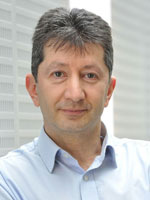King’s College London ALS Researcher Honored with $50,000 Sheila Essey Award at AAN Annual Meeting

The ALS Association and the American Academy of Neurology (AAN) have chosen Professor Ammar Al-Chalabi of King’s College London to receive the 2016 Sheila Essey Award, honoring his contributions to amyotrophic lateral sclerosis (ALS) research and treatment.
Dr. Al-Chalabi will be given the $50,000 award at the AAN’s 68th Annual Meeting taking place in Vancouver, Canada, through April 21. The award was first given in 1996 by the Essey Family Fund in memory of Sheila Essey, who died in 2004 after a 10-year struggle with the disease.
“I am very honored to receive the Sheila Essey Award and I am grateful to my research team and colleagues who make our ALS research possible,” Dr. Al-Chalabi said in a press release.
A professor of Neurology and Complex Disease Genetics, Dr. Al-Chalabi is also the director of the college’s MND Care and Research Center, an ALS clinic in London. He is considered an expert both in ALS research, and in the complex genetics of sporadic and familial ALS.
Previously, he received a Medical Research Council Clinician Scientist Fellowship to advance his genetic research, including a year in Dr. Robert Brown’s laboratory at Massachusetts General Hospital (MGH). While at MGH, Dr. Al-Chalabi completed a genetic linkage study that revealed ALS and frontotemporal dementia (FTD) – a group of disorders caused by progressive nerve cell loss in the brain’s frontal lobes or temporal lobes – could stand as a single disease. This study’s contribution was expanded by the finding of a signal on chromosome 9 that would later reveal itself as the C9orf72 gene mutation, the most frequent genetic cause of ALS.
After this discovery, Dr. Al-Chalabi led an international genome-wide association study that filtered the potential list of ALS genes on chromosome 9 to just three, which was directly related to the C9orf72 expansion mutation discovery. Dr. Al-Chalabi has since collaborated with several American and European institutions and organizations in ALS research.
Dr. Al-Chalabi was also the recipient of a Medical Research Council Clinical Training Fellowship, where he worked with Dr. Nigel Leigh on ALS genetic risk factors. During this fellowship, he set up one of the first DNA banks in ALS research, which is now used to connect with clinic databases. He later earned his PhD at the University of London, where he received the first international Charcot Young Investigator Award for Outstanding Research into ALS.
The ALS Association has funded him for several studies, including the ALSoD, an online ALS genetic database.
Previous Sheila Essey award winners have used the money to continue ALS research or to support other promising young scholars on their investigations.







